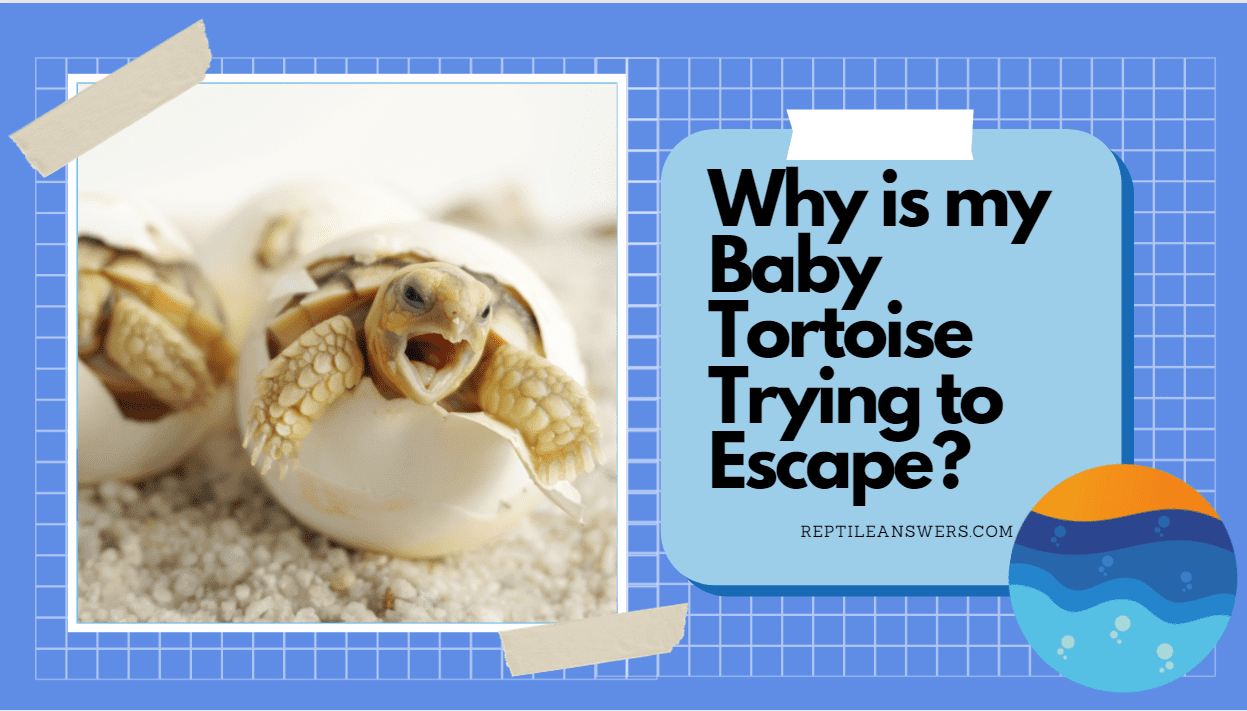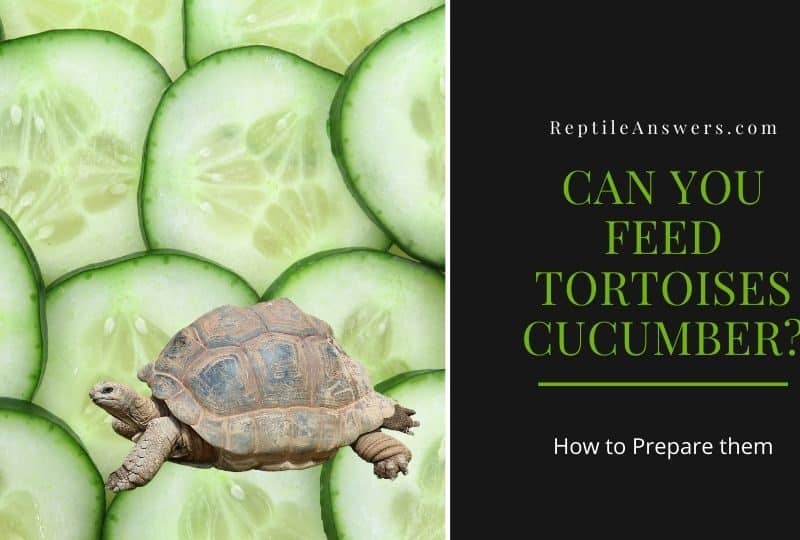If you have a baby tortoise, you may be wondering why he is always trying to escape. Believe it or not, there is a reason for this! Baby tortoises are very active and playful, and they love to explore their surroundings. They are also very curious, which can sometimes lead them astray. In this blog post, we will discuss some of the reasons why your baby tortoise might be trying to escape and what you can do about it.

Why Is My Baby Tortoise Trying to Escape?
There are a few reasons why your baby tortoise might be trying to escape.
- First, they could be too warm and are seeking cooler temperatures. Try moving their enclosure to a shady spot or providing them with a shallow dish of water to cool off.
- Second, they could be hungry or thirsty and are looking for food or water. Make sure their enclosure is stocked with fresh food and water.
- Finally, they could be bored or restless and are looking for something new to do. Try adding some new toys or hiding their food in different places to give them a little stimulation.
If your baby tortoise continues to try to escape, it could be a sign of something more serious, so it’s best to consult with a veterinarian.
How do I stop my tortoise from escaping?
One of the most common problems facing tortoise owners is their pets escaping from their enclosures. Tortoises are curious creatures that love to explore, and they can be quite creative when it comes to finding ways to escape. Luckily, there are a few things you can do to help keep your tortoise safe and sound.
- Make sure the tortoise has a secure enclosure that is escape-proof. This may require some trial and error, as some tortoises are more adept at escaping than others.
- Provide plenty of hiding spots and places to burrow within the enclosure. A tortoise that feels secure and has ample places to hide is less likely to try to escape.
- Consider using a tortoise-proof fence. These fences are specifically designed to keep tortoises in, and they can be a great way to peace of mind.
- Avoid handling the tortoise too much. Some tortoises become stressed when they are handled frequently, which can lead to attempts to escape.
- Provide your tortoise with plenty of things to keep them occupied. A variety of toys and climbing obstacles will help to keep your tortoise healthy and happy.
By following these tips, you can help keep your baby tortoise safe and happy.
Remember, a healthy tortoise is a happy tortoise! Provide your pet with a nutritious diet, plenty of water, and a safe and secure enclosure, and they will be sure to live a long and happy life.
Why does my tortoise want to climb?
If your tortoise is spending more time out of its shell than in it, there’s no cause for alarm. Tortoises are natural explorers, and their desire to climb probably means that they’re just following their instincts. In the wild, tortoises spend most of their time on the ground, but they will occasionally climb onto rocks or logs to bask in the sun or to get a better view of their surroundings.
While it may seem strange to us, there are actually a few reasons why tortoises like to climb.
- First of all, tortoises are natural foragers and climbers. In the wild, they often have to search for food in trees and bushes.
- Additionally, tortoises enjoy basking in the sun, and climbing gives them a chance to find a warm spot.
- Finally, some tortoises simply enjoy the challenge of climbing.
Whatever the reason, there’s no need to worry if your tortoise wants to scale a few heights, it’s just part of their nature.
Why does my tortoise want to climb?
There are a few reasons why your tortoise might be climbing the walls. One possibility is that they are trying to escape their enclosure. If the enclosure is too small or doesn’t have enough enrichment, tortoises can become stressed and try to find a way out. Another possibility is that they are looking for a mate.
In the wild, tortoises will often climb trees or steep slopes in order to find a mate. If your tortoise is male and you don’t have another tortoise for them to mate with, they may try to escape in search of a female.
Finally, some tortoises simply enjoy climbing and may do it for no specific reason. If your tortoise is healthy and its enclosure is adequate, there’s no need to worry.
While it’s perfectly normal for tortoises to want to explore their environment, it’s important to make sure that they have a safe place to do so. Their shells are vulnerable to injury if they fall, so be sure to provide a soft landing spot if your tortoise decides to take a trip up the wall.
Why does my tortoise keep pacing?
If you have a pet tortoise, you may have noticed that they sometimes pace back and forth in their enclosure. While this behavior may seem unusual, there are actually a few reasons why tortoises pace.
- First of all, the pacing is a way for tortoises to exercise. They need to keep their muscles strong and their joints healthy, so a little pacing is good for them.
- Additionally, tortoises pace when they’re looking for something. They might be searching for food or water, or they might be trying to find a way out of their enclosure.
- Pacing is also a sign of stress. If your tortoise is stressed, he may pace as a way to release some of that energy. You can help reduce your tortoise’s stress by providing him with a calm, quiet environment and by giving him plenty of attention.
If your tortoise is pacing a lot, it’s important to make sure that they have everything they need. Provide them with plenty of food and water, and make sure their enclosure is escape-proof. If you can’t keep them in a regular enclosure, consider getting them a tortoise table or habitat.
If your tortoise is pacing for any of the reasons listed above, there’s no need to worry. It’s just a sign that he’s healthy and active!
Conclusion
Your tortoise is probably just following its natural instincts by trying to escape, foraging, and bask in the sun. There’s no need to worry as long as they’re safe and have everything they need. But, if he’s pacing a lot of climbing the walls, it’s important to keep an eye on him as this can be dangerous for his shell.
FAQs
How do I know if my tortoise needs to be re-homed?
If your tortoise is trying to escape from its habitat, it may need a new home. If your tortoise is constantly active and seems to be trying to get out of its enclosure, it may also need a new home. Contact your veterinarian or local reptile rescue group if you have questions about whether or not your tortoise needs a new home.
Re-homing a tortoise can be difficult, but it is important to make sure that your tortoise is in a safe and healthy environment. Contact your veterinarian or local reptile rescue group for more information on re-homing a tortoise.
What are some other signs that my tortoise might need help?
If your tortoise is not eating, has watery diarrhea, or is showing other signs of illness, it may need help. Contact your veterinarian if you have questions about whether or not your tortoise needs medical care.
It is important to remember that each tortoise is different and may require different care. If you have questions about your tortoise’s health or behavior, contact your veterinarian or local reptile rescue group.
How do I know if my baby tortoise is happy?
There is no one-size-fits-all answer to this question, as each baby tortoise will have its own personality. However, you can watch for signs that your baby tortoise is happy and healthy.
Some things to look for include:
- Active and alert when awake
- Eats regularly
- Good weight gain
- No signs of illness



